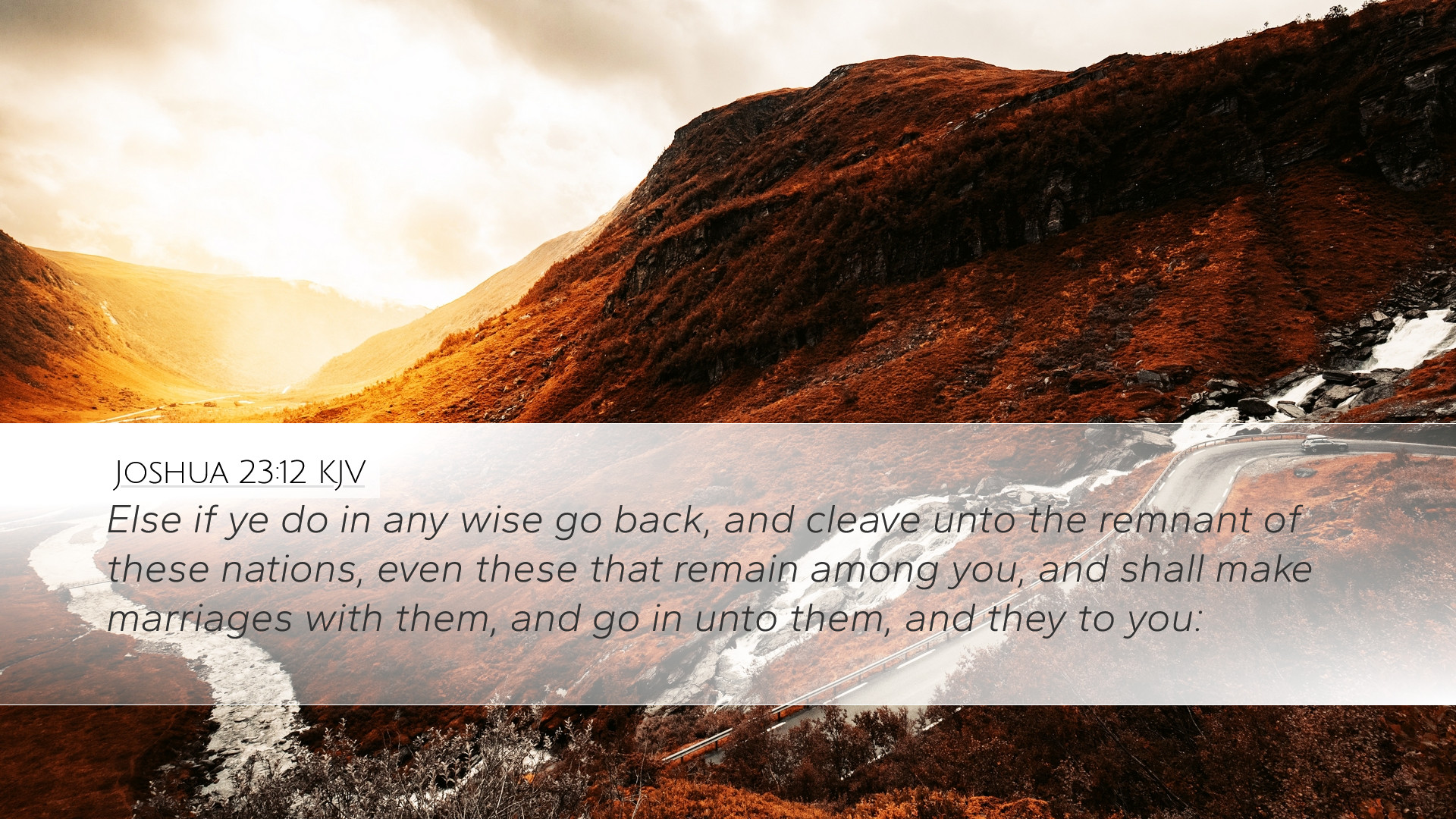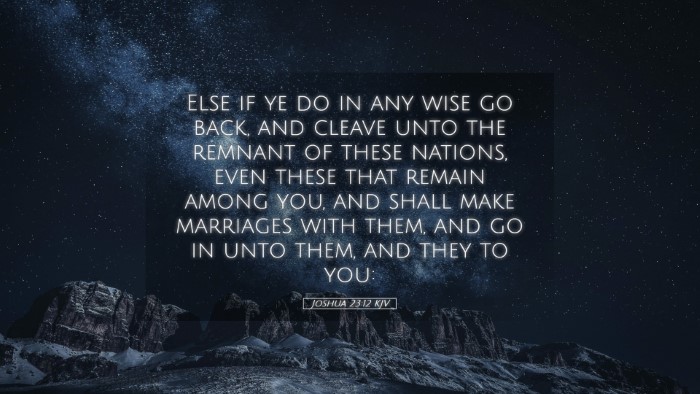Old Testament
Genesis Exodus Leviticus Numbers Deuteronomy Joshua Judges Ruth 1 Samuel 2 Samuel 1 Kings 2 Kings 1 Chronicles 2 Chronicles Ezra Nehemiah Esther Job Psalms Proverbs Ecclesiastes Song of Solomon Isaiah Jeremiah Lamentations Ezekiel Daniel Hosea Joel Amos Obadiah Jonah Micah Nahum Habakkuk Zephaniah Haggai Zechariah MalachiJoshua 23:12
Joshua 23:12 KJV
Else if ye do in any wise go back, and cleave unto the remnant of these nations, even these that remain among you, and shall make marriages with them, and go in unto them, and they to you:
Joshua 23:12 Bible Commentary
Bible Commentary on Joshua 23:12
Verse Reference: Joshua 23:12 - "But if you turn away and ally yourselves with the survivors of these nations that remain among you and if you intermarry with them and associate with them,
Introduction
The closing chapters of the book of Joshua serve as a critical reminder of God’s faithfulness and a call for obedience among His people. Joshua, now advanced in age, speaks to the tribes of Israel, urging them to remember the Lord's commands. Joshua 23:12 serves as a specific warning against the dangers of intermingling with foreign nations, which symbolizes the potential spiritual downfall of Israel. Some of the most insightful public domain commentaries help us understand these warnings more deeply.
Matthew Henry's Commentary
Henry points out that this verse illustrates a crucial principle regarding the association with those who do not share the same faith. The warning about turning away indicates the nature of human tendency to stray away from God's commands when we surround ourselves with worldly influences. Henry emphasizes that the people must remain separate and distinct to ensure their devotion and obedience to Yahweh.
- Spiritual Compromise: Henry explicitly states that marrying into foreign nations may lead to a dilution of faith, ultimately causing one to forsake God for the idols of these nations.
- Spiritual Vigilance: He encourages vigilance, as the corruption could subtly creep into the Israelite community through their relationships with surrounding nations.
- God's Commands Prevail: Henry reminds believers that the Lord's commands are always to be prioritized above all, highlighting that allegiance to Him is a source of strength.
Albert Barnes' Notes
Barnes provides a deep exploration of the implications of intermingling with the Canaanites. He underscores that God’s commands are not just arbitrary rules but are grounded in the need for holiness and separation from sin. Barnes comments that:
- Consequences of Disobedience: The potential risks that Joshue warns about are not merely hypothetical; they lead to tangible judgment from God if the Israelites forsake their covenant.
- Emotional and Spiritual Consequences: Barnes elaborates on how intermarriage could impact the affections and commitments of the people, leading them away from God.
- Call to Legacy: The context of Joshua’s speech implies a legacy of faith that must be protected from outside influences; a call for the future generation to remember the ways of the Lord.
Adam Clarke's Commentary
Clarke’s analysis of Joshua 23:12 dives into the sociocultural ramifications of intermarrying with the local populations. He emphasizes that Israel was called to be a unique nation, set apart for God's purposes. Clarke notes:
- Theological Implications: He reflects on how such alliances could lead to the spiritual decline of Israel, ultimately affecting their relationship with God.
- Covenant Relationships: Clarke reminds us about the significance of covenant relationships, emphasizing that the loyalty of Israel must be directed solely towards God and His commandments.
- Historical Context: He provides insight into the historical context where intermarriage with foreign nations was a prevalent practice, increasing the urgency of Joshua's message.
The Great Danger of Compromise
Both Henry, Barnes, and Clarke highlight the overarching theme of compromise present in Joshua 23:12. Compromise with surrounding nations could lead to:
- Idolatry: A significant concern was that foreign nations worshiped other gods, and intermarriage could entice the Israelites to engage in worship practices contrary to their covenant with Yahweh.
- Covenantal Loyalty: The heart of the message is the call to remain loyal to God's covenant; any form of compromise is not only dangerous but represents a failure to uphold the commitments made before God.
Application for Today
In considering the implications of Joshua 23:12 for modern readers, spiritual leaders, and theologians, we must reflect on how the principles outlined remain timeless in guiding conduct and faithfulness to God. The themes of vigilance and loyalty transcend time and approach various aspects of life, such as relationships, societal influences, and personal faith.
- Encouragement for Believers: Faithful living requires a commitment to surrounding oneself with individuals and communities that strengthen one's faith rather than lead it astray.
- Reflection on Influence: One should assess the influences they permit in their lives, whether they hinder spiritual growth or foster a deeper commitment to God.
- Community Dynamics: Churches and faith communities should heed Joshua's warnings, taking care to preserve their distinctiveness as the people of God.
Conclusion
The admonition in Joshua 23:12 remains a relevant and poignant reminder for all believers. Through the insights provided by Henry, Barnes, and Clarke, we are detailed the dangers of compromise and the essence of covenant fidelity. Staying true to God amidst external pressures is a profound challenge but one that holds the promise of growth and blessing for those who remain faithful.


